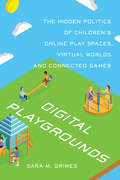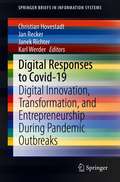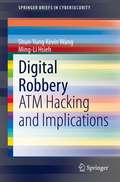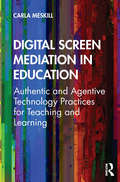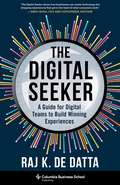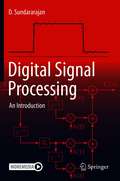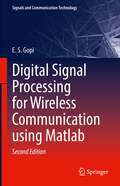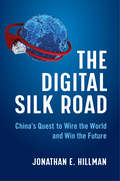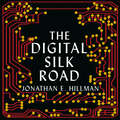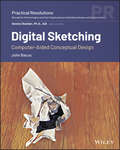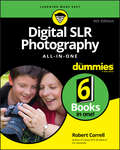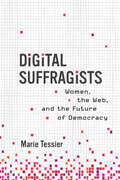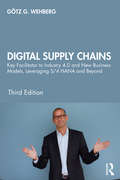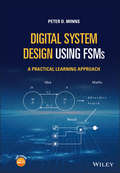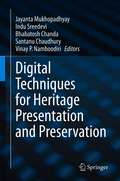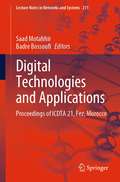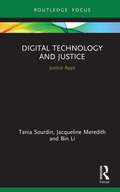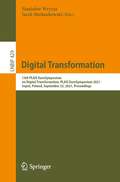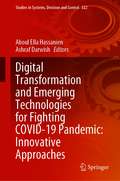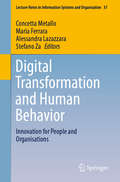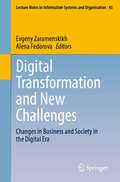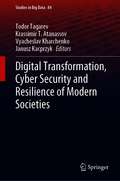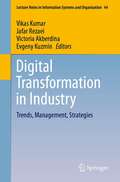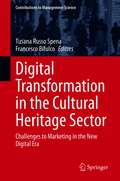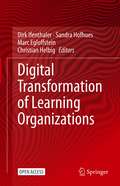- Table View
- List View
Digital Playgrounds: The Hidden Politics of Children’s Online Play Spaces, Virtual Worlds, and Connected Games
by Sara GrimesDigital Playgrounds explores the key developments, trends, debates, and controversies that have shaped children’s commercial digital play spaces over the past two decades. It argues that children’s online playgrounds, virtual worlds, and connected games are much more than mere sources of fun and diversion – they serve as the sites of complex negotiations of power between children, parents, developers, politicians, and other actors with a stake in determining what, how, and where children’s play unfolds. Through an innovative, transdisciplinary framework combining science and technology studies, critical communication studies, and children’s cultural studies, Digital Playgrounds focuses on the contents and contexts of actual technological artefacts as a necessary entry point for understanding the meanings and politics of children’s digital play. The discussion draws on several research studies on a wide range of digital playgrounds designed and marketed to children aged six to twelve years, revealing how various problematic tendencies prevent most digital play spaces from effectively supporting children’s culture, rights, and – ironically – play. Digital Playgrounds lays the groundwork for a critical reconsideration of how existing approaches might be used in the development of new regulation, as well as best practices for the industries involved in making children’s digital play spaces. In so doing, it argues that children’s online play spaces be reimagined as a crucial new form of public sphere in which children’s rights and digital citizenship must be prioritized.
Digital Responses to Covid-19: Digital Innovation, Transformation, and Entrepreneurship During Pandemic Outbreaks (SpringerBriefs in Information Systems)
by Christian Hovestadt Jan Recker Janek Richter Karl WerderThis book presents ten essays that examine the potential of digital responses to the COVID-19 pandemic. The essays explore new digital concepts for learning and teaching, provide an overview of organizational responses to the crisis through digital technologies, and examine digital solutions developed to manage the crisis. Scientists from many disciplines work together in the fight against the virus and its numerous consequences. This book explores how information systems researchers can contribute to these global efforts. The book will be of interest to researchers and scholars in the field of digital business and education.
Digital Robbery: ATM Hacking and Implications (SpringerBriefs in Cybersecurity)
by Shun-Yung Kevin Wang Ming-Li HsiehThis book begins with a broader discussion of cybercrime and attacks targeting ATMs and then focuses on a specific type of cybercrime named “ATM Hacking.” It discusses ATM Hacking from a more full scope of aspects, including technology, modus operandi, law enforcement, socio-economic and geopolitical context, and theory development. After unpacking a classic case of ATM Hacking and its modus operandi, implications for cybersecurity and prevention, intra- and inter-agency collaboration, and theory development are presented.This book also demonstrates the analysis of extensive qualitative data collected from a high-profile case in which European criminal group hacked into a London voice mail server belonging to a Taiwanese financial institution – First Commercial Bank,. Then it programmed dozens of ATMs to “spit out” millions of dollars of cash. The successful crackdown on this type of crime is rare, if not unique, while the number of similar crimes has increased enormously in recent years and the trend seem to continue unabatingly. Further, the implications go beyond a country or a continent. Intra- and inter-agency collaboration among players of law enforcement is essential to the case especially in the police context of “turf jealousies.”The authors seek to document the ways in which agencies collaborate, as well as the perceived benefits and challenges of cooperation. Whether the broader political and contextual climates in which these agencies operate, limit the extent to which they can cooperate.This book is useful as a reference for researchers and professionals working in the area of cybercrime and cybersecurity. University professors can also use this book as a case study for senior seminars or graduate courses.
Digital Screen Mediation in Education: Authentic and Agentive Technology Practices for Teaching and Learning
by Carla MeskillDigital Screen Mediation in Education explores the complex role of visual mediation in today’s digitally enhanced classrooms. While the notion that technology tools have agency—that they act to induce learning—pervades contemporary conversations about pedagogy, this unique volume reframes instructional agency around teachers. The book’s theoretically reinforced and multidisciplinary approach to enhancing effective instruction with screen-based technologies spans aesthetics, technical knowledge, teacher empowerment, social media, and beyond. Researchers in educational technology, instructional design, online learning, and digital pedagogies as well as prospective and practicing educators will find a rigorous treatment of how skilled, thoughtful teaching with, through, and around digital screens can bring about successful learning outcomes.
The Digital Seeker: A Guide for Digital Teams to Build Winning Experiences
by Raj K. DattaThe internet was supposed to connect us to endless possibilities. So why do we keep ending up browsing the same old sites and best-seller lists? When sellers don’t offer potential customers a compelling digital experience, consumers miss out on great products—and businesses miss a vital opportunity to grow.Raj K. De Datta, the founder of a company that powers digital-commerce experiences for many of the world’s biggest brands, offers an actionable playbook for companies looking to deliver better digital experiences. His key insight is that exceptional digital experiences are much more than marketplaces. They don’t just serve customers’ transactional needs but rather address the deeper problems for which they seek solutions. They are built on a digital-experience platform that provides agile, personalized, scalable performance. And they are created by product-centric digital teams, not traditional organizations.The Digital Seeker distills key lessons from the compelling stories of innovative businesses: not just tech companies but companies spanning a wide range of industries, including amusement parks, fashion, sports, health care, distribution, and the public sector. De Datta defines and explains the power of the seeker-centric philosophy—translating it into a core operational playbook for digital teams to achieve transformative results.Importantly, this book also offers crucial insights into the impact of the COVID-19 pandemic on our digital lives and the long-term effects it will have on digital experiences of the future.
Digital Signal Processing: An Introduction
by Dr. D. SundararajanThis textbook for a one semester introductory course in digital signal processing for senior undergraduate and first year graduate students in electrical and computer engineering departments is concise, highly readable, and yet provides comprehensive coverage of the topic. Each new topic is presented with examples and figures. The highly mathematical content of the topic is presented lucidly to make the learning the subject easier. Practical aspects of the subject are clearly indicated so that the student can apply the principles in real applications. Matlab programs for FIR filter design are provided as supplementary material online.
Digital Signal Processing for Wireless Communication using Matlab (Signals and Communication Technology)
by E.S. GopiThe updated book presents Matlab illustrations on various digital signal processing (DSP) techniques such as random process, time varying wireless system model, and detection and estimation theory used in wireless communication. The book also covers recent wireless techniques like OFDM, massive MIMO techniques, non-orthogonal multiple access, millimeter wave MIMO, full duplex, cognitive radio, co-operating communication, unmanned aerial vehicles etc. This book is suitable for those who are doing basic and applied research in digital signal processing for wireless communication.
The Digital Silk Road: China's Quest to Wire the World and Win the Future
by Jonathan E. HillmanAn expert on China’s global infrastructure expansion provides an urgent look at the battle to connect and control tomorrow’s networks.From the ocean floor to outer space, China’s Digital Silk Road aims to wire the world and rewrite the global order. Taking readers on a journey inside China’s surveillance state, rural America, and Africa’s megacities, Jonathan Hillman reveals what China’s expanding digital footprint looks like on the ground and explores the economic and strategic consequences of a future in which all routers lead to Beijing.If China becomes the world’s chief network operator, it could reap a commercial and strategic windfall, including many advantages currently enjoyed by the United States. It could reshape global flows of data, finance, and communications to reflect its interests. It could possess an unrivaled understanding of market movements, the deliberations of foreign competitors, and the lives of countless individuals enmeshed in its networks. However, China’s digital dominance is not yet assured. Beijing remains vulnerable in several key dimensions, the United States and its allies have an opportunity to offer better alternatives, and the rest of the world has a voice. But winning the battle for tomorrow’s networks will require the United States to innovate and take greater risks in emerging markets. Networks create large winners, and this is a contest America cannot afford to lose.
The Digital Silk Road: China's Quest to Wire the World and Win the Future
by Jonathan E. HillmanIts vast infrastructure projects now extend from the ocean floor to outer space, and from Africa's megacities into rural America. China is wiring the world, and, in doing so, rewriting the global order.As things stand, the rest of the world still has a choice. But the battle for tomorrow will require America and its allies to take daring risks in uncertain political terrain. Unchecked, China will reshape global flows of data to reflect its interests. It willdevelop an unrivalled understanding of market movements, the deliberations of foreign competitors, and the lives of countless individuals enmeshed in its systems. Networks create large winners, and this is one contest that democracies can't afford to lose.Taking readers on a global tour of these emerging battlefields, Jonathan Hillman reveals what China's digital footprint looks like on the ground, and explores the dangers of a world in which all routers lead to Beijing.
Digital Sketching: Computer-Aided Conceptual Design (Practical Revolution)
by John BacusLearn to apply new digital design technologies at your own firm with this practical and insightful resource Digital Sketching: Computer-Aided Conceptual Design delivers a comprehensive and insightful examination of how architects and other design professionals can best use digital design technology to become better designers. Celebrated professional, professor, and author John Bacus provides readers with practical and timely information on emerging digital design technologies and their effect on professional practice. By focusing on the big picture, this rigorous survey of conceptual design technology offers professionals realistic strategies for reclaiming time for design in the ever increasing speed of project delivery. This book helps architects (and others like them) learn to use digital sketching techniques to be better designers, right from the project’s very first sketch. As part of the groundbreaking Practical Revolutions series of books, Digital Sketching furthers the conversation of the practical deployment of emerging technologies in the building industries. This book provides readers with the information they need to evaluate digital design technology and decide whether or not to adopt and integrate it into their own processes. Readers will receive: An accelerated and accessible introduction to a highly technical topic Practical and applicable guidance on how to adapt a firm’s business to adopt new technology without losing the benefit of existing intuition, skill, and experience. Real world implementations of specific techniques in the form of illuminating case studies that include results and lessons learned Perfect for professional architectural designers, Digital Sketching also belongs on the bookshelves of interior designers, landscape architects, urban planners, contractors, and specialty fabricators of every kind. A disciplined sketching practice, especially through the digital methods discussed in this book, is a transformational benefit to anyone who designs and builds for a living.
Digital SLR Photography All-in-One For Dummies
by Robert Correll6 Books in one! Boost your DSLR photography skills with this amazing book When you're investing in top-notch camera equipment, it's also time to build top-notch photography skills that help you create the stunning images you see in your mind. This book gets you started on the path to capturing incredible photos of life's most precious moments. Cut through the jargon and techspeak as you get down to the essentials of taking control of your powerful camera and leaving the days of washed-out and blurry photos behind. 6 Books Inside… Review digital photography basics and camera controls Get the right lens for the shot Take creative control of exposure settings Shed some light on your subject Perfect the picture with editing Follow recipes for portraits, landscapes, close-ups, and action shots
Digital Suffragists: Women, the Web, and the Future of Democracy
by Marie TessierWhy women&’s voices are outnumbered online and what we can do about it, by a New York Times comment moderator.If you&’ve read the comments posted by readers of online news sites, you may have noticed the absence of women&’s voices. Men are by far the most prolific commenters on politics and public affairs. When women do comment, they are often attacked or dismissed more than men are. In fact, the comment forums on news sites replicate conditions of the offline and social media worlds, where women are routinely interrupted, threatened, demeaned, and called wrong, unruly, disgusting, and out of place. In Digital Suffragists, Marie Tessier—a veteran journalist and a New York Times comment moderator for more than a decade—investigates why women&’s voices are outnumbered online and what we can do about it. The suffragists of the early twentieth century were jailed for trying to vote. Can a twenty-first century democracy be functional when half of the population is not fully represented in a primary form of political communication? Tessier shows that for online comments, it&’s a design problem: the linear blog comment formula was based on deeply gender-biased assumptions. Technologies designed with a broad range of end users in mind, she points out, are more successful and beneficial than those that reflect the designer&’s own habits of mind. Tessier outlines benchmarks for a more democratic media, all of which stem from one fundamental idea: media must adopt gender and racial representation as key performance indicators. Equal speaking time for women is a measure of democracy.
Digital Supply Chains: Key Facilitator to Industry 4.0 and New Business Models, Leveraging S/4 HANA and Beyond
by Götz G. WehbergThis book provides a practical guide to digital supply chain modelling, demonstrating an agile approach to how such models can be applied to any manufacturing company to build competitive advantage, facilitate new business models and drive towards Industry 4.0. The agile approach of the book provides an attractive alternative to the conventional country-by-country deployment of S/4 HANA and other relevant technologies. This book contains the expertise Gotz G. Wehberg has amassed over 20 years as a senior partner in a leading consulting company, working across industries and with globally recognized clients, advising on digitization. In it, he explains the scientific roots of digital supply chain management such as holism, cybernetics, self-organization and evolutionary theory to inform a deep understanding that can drive a supremely innovative strategy for Industry 4.0. Beyond strategy, Wehberg introduces the practical tools and technologies used in supply chain modelling, for example, sensors, big data, artificial intelligence and the Internet of Things, as well as a reference framework that categorizes the technologies, together with the latest concepts and tools, such as DDMRP, predictive S&OP, pattern recognition, autonomous logistics and Lean. This framework supports decision making for developing supply chains in an end-to-end and cross-functional fashion, providing clear guidance for executives and managers on how to design supply chains for the future.
Digital System Design using FSMs: A Practical Learning Approach
by Peter D. MinnsThis is a complete update of the author's earlier book, FSM-Based Digital Design using Verilog HDL (Wiley 2008). Whilst the essential foundation content remains, the book has been considerably refreshed to cover the design of Finite State Machines (FSM) in place of Microprocessors, using a novel form of State Machines based on Toggle Flip Flops (TFF) and Data Flip Flops (DFF). It follows a Linear Programmed Learning approach, enabling the reader to learn at their own pace, and to design their own FSM based systems.
Digital Techniques for Heritage Presentation and Preservation
by Jayanta Mukhopadhyay Indu Sreedevi Bhabatosh Chanda Santanu Chaudhury Vinay P. NamboodiriThis book describes various new computer based approaches which can be exploited for the (digital) reconstruction, recognition, restoration, presentation and classification of digital heritage. They are based on applications of virtual reality, augmented reality and artificial intelligence, to be used for storing and retrieving of historical artifacts, digital reconstruction, or virtual viewing.The book is divided into three sections: “Classification of Heritage Data” presents chapters covering various domains and aspects including text categorization, image retrieval and classification, and object spotting in historical documents. Next, in “Detection and Recognition of Digital Heritage Artifacts”, techniques like neural networks or deep learning are used for the restoration of degraded heritage documents, Tamil Palm Leaf Characters recognition, the reconstruction of heritage images, and the selection of suitable images for 3D reconstruction and classification of Indian land mark heritage images. Lastly, “Applications of Modern Tools in Digital Heritage” highlights some example applications for dance transcription, architectural geometry of early temples by digital reconstruction, and computer vision based techniques for collecting and integrating knowledge on flora.This book is mainly written for researchers and graduate students in digital preservation and heritage, or computer scientists looking for applications of virtual reality, computer vision, and artificial intelligence techniques.
Digital Technologies and Applications: Proceedings of ICDTA 21, Fez, Morocco (Lecture Notes in Networks and Systems #211)
by Saad Motahhir Badre BossoufiThis book gathers selected research papers presented at the First International Conference on Digital Technologies and Applications (ICDTA 21), held at Sidi Mohamed Ben Abdellah University, Fez, Morocco, on 29–30 January 2021. highlighting the latest innovations in digital technologies as: artificial intelligence, Internet of things, embedded systems, network technology, information processing, and their applications in several areas such as hybrid vehicles, renewable energy, robotic, and COVID-19. The respective papers encourage and inspire researchers, industry professionals, and policymakers to put these methods into practice.
Digital Technology and Justice: Justice Apps
by Tania Sourdin Jacqueline Meredith Bin LiJustice apps – mobile and web-based programmes that can assist individuals with legal tasks – are being produced, improved, and accessed at an unprecedented rate. These technologies have the potential to reshape the justice system, improve access to justice, and demystify legal institutions. Using artificial intelligence techniques, apps can even facilitate the resolution of common legal disputes. However, these opportunities must be assessed in light of the many challenges associated with app use in the justice sector. These include the digital divide and other accessibility issues; the ethical challenges raised by the dehumanisation of legal processes; and various privacy, security, and confidentiality risks. Surveying the landscape of this emergent industry, this book explores the objectives, opportunities, and challenges presented by apps across all areas of the justice sector. Detailed consideration is also given to the use of justice apps in specific legal contexts, including the family law and criminal law sectors. The first book to engage with justice apps, this book will appeal to a wide range of legal scholars, students, practitioners, and policy-makers.
Digital Transformation: 13th PLAIS EuroSymposium on Digital Transformation, PLAIS EuroSymposium 2021, Sopot, Poland, September 23, 2021, Proceedings (Lecture Notes in Business Information Processing #429)
by Stanisław Wrycza Jacek MaślankowskiThis book constitutes the refereed proceedings of the 13th PLAIS EuroSymposium 2021 which was held in Sopot, Poland, on September 23, 2021. The objective of the PLAIS EuroSymposium 2021 is to promote and develop high quality research on all issues related to digital transformation. It provides a forum for IS researchers and practitioners in Europe and beyond to interact, collaborate, and develop this field. The 10 papers presented in this volume were carefully reviewed and selected from 34 submissions. They were organized in topical sections named: digital enterprises; smart cities; digital education; and innovative methods in data and process analysis.
Digital Transformation and Emerging Technologies for Fighting COVID-19 Pandemic: Innovative Approaches (Studies in Systems, Decision and Control #322)
by Aboul Ella Hassanien Ashraf DarwishThis book is one of the first books that deal with the COVID-19 pandemic. COVID-19 pandemic has affected countries all over the world and has made a significant impact on daily life and healthcare facilities and treatment systems. The book covers the main recent emerging technologies that are related to the COVID-19 crisis. The technologies that are included in this book play a significant role in tackling COVID-19 in the future.The scope of this book is to cover all advanced emerging technologies and artificial intelligence techniques to fight against COVID-19 pandemic.
Digital Transformation and Human Behavior: Innovation for People and Organisations (Lecture Notes in Information Systems and Organisation #37)
by Concetta Metallo Maria Ferrara Alessandra Lazazzara Stefano ZaThe digital transformation is impacting various aspects of how we live and work. Due to the pervasive effects of the digital revolution on firms and societies, both scholars and practitioners are interested in better understanding the key mechanisms behind the related challenges. This book presents a collection of research papers focusing on the relationships between technologies (e.g. artificial intelligence, social media, and the Internet of Things) and behaviours (e.g. social learning, knowledge sharing, and decision-making). Moreover, it provides insights into how the digital transformation may improve quality of personal life and work life within public and private organisations. The plurality of views offered makes this book particularly relevant for practitioners, companies, scientists, and governments. It gathers a selection of the best papers - original double-blind peer-reviewed contributions - presented at the annual conference of the Italian chapter of the AIS which was held in Naples, Italy, in September 2019.
Digital Transformation and New Challenges: Changes in Business and Society in the Digital Era (Lecture Notes in Information Systems and Organisation #45)
by Evgeny Zaramenskikh Alena FedorovaThis book gathers the best papers presented at the second conference held by the Russian chapter of the Association for Information Systems (AIS), which took place in Yekaterinburg, Russian Federation, in December 2019. It shares the latest insights into various aspects of the digitalization of the economy and the consequences of transformation in public administration, business and public life. Integrating a broad range of analytical perspectives, including economic, social and technological, this interdisciplinary book is particularly relevant for scientists, digital technology users, companies and public institutions.
Digital Transformation, Cyber Security and Resilience of Modern Societies (Studies in Big Data #84)
by Krassimir T. Atanassov Janusz Kacprzyk Vyacheslav Kharchenko Todor TagarevThis book presents the implementation of novel concepts and solutions, which allows to enhance the cyber security of administrative and industrial systems and the resilience of economies and societies to cyber and hybrid threats. This goal can be achieved by rigorous information sharing, enhanced situational awareness, advanced protection of industrial processes and critical infrastructures, and proper account of the human factor, as well as by adequate methods and tools for analysis of big data, including data from social networks, to find best ways to counter hybrid influence. The implementation of these methods and tools is examined here as part of the process of digital transformation through incorporation of advanced information technologies, knowledge management, training and testing environments, and organizational networking. The book is of benefit to practitioners and researchers in the field of cyber security and protection against hybrid threats, as well as to policymakers and senior managers with responsibilities in information and knowledge management, security policies, and human resource management and training.
Digital Transformation in Industry: Trends, Management, Strategies (Lecture Notes in Information Systems and Organisation #44)
by Vikas Kumar Jafar Rezaei Victoria Akberdina Evgeny KuzminThis book offers a selection of the best papers presented at the international scientific conference "Digital Transformation in Industry: Trends, Management, Strategies", held by the Institute of Economics of the Ural Branch of the Russian Academy of Sciences, Russia in November 2020. The main focus of the book is to evaluate trends and perspectives of digital transformation in industry and industrial markets through the dissemination of Industry 4.0. The aim of the topics discussed is to create an idea of introduction mechanisms for digitization processes and to specify successful strategies of digital transformation in all sectors of industrial enterprises. The experience of developed and developing economies, as well as small and large enterprises implementing IT and other technological innovations are included. Students as well as managers of industrial organizations alike can benefit from the results of the topics covered.
Digital Transformation in the Cultural Heritage Sector: Challenges to Marketing in the New Digital Era (Contributions to Management Science)
by Tiziana Russo Spena Francesco BifulcoThis book devises an alternative conceptual framework to understand digital transformation in the cultural heritage sector. It achieves this by placing a high importance on the role of technology in the strategic process of modeling and developing cultural services in the digital era. The focus is on how marketing activities and customer processes are being transformed by digital technologies to create better value, which can also be communicated to customers through an engaged and personalized approach. Much of the digital debate in cultural heritage is still in infancy. Some existing studies are anecdotal and often developed within the domain of established research streams, including studies with some technological aspects addressed partially and from an episodic or periodic perspective. Moreover, the critical changes that have emerged in the cultural management landscape are yet to be highlighted. This book fills that gap and provides a perspective on the cultural heritage sector, which uses the new social and technology landscape to describe the digital transformation in cultural heritage sectors. The authors highlight an inclusive perspective that addresses marketing strategy in the digital era as a proactive, technology-enabled process by which firms collaborate with customers to jointly create, communicate, deliver, and sustain experience and value co-creation.
Digital Transformation of Learning Organizations
by Dirk Ifenthaler Sandra Hofhues Marc Egloffstein Christian HelbigThis open access volume provides insight into how organizations change through the adoption of digital technologies. Opportunities and challenges for individuals as well as the organization are addressed. It features four major themes: 1. Current research exploring the theoretical underpinnings of digital transformation of organizations. 2. Insights into available digital technologies as well as organizational requirements for technology adoption. 3. Issues and challenges for designing and implementing digital transformation in learning organizations. 4. Case studies, empirical research findings, and examples from organizations which successfully adopted digital workplace learning.
